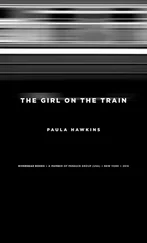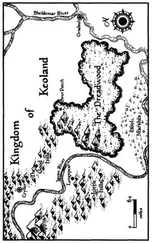He fell silent for so long that I thought maybe the conversation was over. I was just about to leave the room when suddenly he said, ‘You should ask Lena about that.’
‘I was planning to,’ I told him, ‘only she wasn’t all that interested in talking to me.’ I filled him in on the encounter at the bridge.
‘This woman,’ he said. ‘Describe her.’
So I did: early forties, slightly on the heavy side, dark hair, wearing a long red cardigan despite the heat.
Townsend studied me for a long time.
‘Doesn’t ring any bells then?’ I asked.
‘Oh yes,’ he said, looking at me as though I was a particularly simple child. ‘It’s Louise Whittaker.’
‘And she is?’
He frowned. ‘Have you not seen any background on this?’
‘I haven’t, actually,’ I said. I felt like pointing out that filling me in on any relevant background might be considered to be his job, since he was the local.
He sighed and began tapping at the keys of his computer. ‘You should be up to speed with all this. You should have been given the files.’ He smacked a particularly vicious return, as though he was banging keys on a typewriter rather than an expensive-looking iBook. ‘And you should also read through Nel Abbott’s manuscript.’ He looked up at me and frowned. ‘The project she was working on? It was going to be a sort of coffee-table book, I think. Pictures and stories about Beckford.’
‘A local history?’
He exhaled sharply. ‘Of sorts. Nel Abbott’s interpretation of events. Of selected events. Her … spin on things. As I mentioned, not something that many of the locals were keen on. We have copies, in any case, of what she’d written so far. One of the DCs will get you one. Ask Callie Buchan – you’ll find her out front. The point is that one of the cases she wrote about was that of Katie Whittaker, who took her own life in June. Katie was a close friend of Lena Abbott’s and Louise, her mother, was once friendly with Nel. They fell out, apparently over the focus of Nel’s work, and then when Katie died …’
‘Louise blamed her,’ I said. ‘She holds her responsible.’
He nodded. ‘Yes, she does.’
‘So I should go and talk to her then, this Louise?’
‘No,’ he replied. His eyes remained on the screen. ‘I’ll do it. I know her. I was the DI on the investigation into her daughter’s death.’
He fell into another long silence. He hadn’t dismissed me, so eventually I spoke. ‘Was there ever any suspicion that there was anyone else involved in Katie’s death?’
He shook his head. ‘None. There didn’t appear to be a clear reason, but as you well know there often isn’t. Not one that makes sense to those left behind, in any case. But she did leave a note saying goodbye.’ He passed his hand over his eyes. ‘It was just a tragedy.’
‘So two women have died in that river this year?’ I said. ‘Two women who knew each other, who were connected …’ The DI said nothing, he didn’t look at me, I wasn’t even sure he was listening. ‘How many have died there? I mean, in total?’
‘Since when?’ he asked, shaking his head again. ‘How far back would you like to go?’
Like I said, fucking weird.
Jules
I’VE ALWAYS BEEN a little bit afraid of you. You knew that, you enjoyed my fear, enjoyed the power it gave you over me. So I think, despite the circumstances, you would have enjoyed this afternoon.
They asked me to do the identification – Lena volunteered, but they told her no, so I had to say yes. There was no one else. And although I didn’t want to see you, I knew that I had to, because seeing you would be better than imagining you; the horrors conjured up by the mind are always so much worse than what is . And I needed to see you, because we both know that I wouldn’t believe it, wouldn’t be able to believe that you were gone, until I did.
You lay on a gurney in the middle of a cold room, a pale-green sheet covering your body. There was a young man there, dressed in scrubs, who nodded at me and at the detective, and she nodded back. As he reached out his hand to pull back the sheet I held my breath. I can’t remember feeling that afraid since I was a child.
I was waiting for you to jump out at me.
You didn’t. You were still and beautiful. There was always so much in your face – so much expression, joy or venom – and it was all still there, the traces of it; you were still you, still perfect, and then it struck me: you jumped.
You jumped?
You jumped ?
That word, which felt wrong in my mouth. You wouldn’t jump. You never would, that’s not the way to do it. You told me that. The cliff’s not high enough, you said. It’s only fifty-five metres from the clifftop to the surface of the water – people can survive the fall. So, you said, if you mean it, if you really mean it, you need to make sure. Go in head first. If you mean it, you don’t jump, you dive.
And unless you mean it, you said, why do it? Don’t be a tourist. No one likes a tourist.
People can survive the fall, but that doesn’t mean they will. Here you are, after all, and you didn’t dive. You went in feet first and here you are: your legs are broken, your back is broken, you are broken. What does that mean, Nel? Does it mean that you lost your nerve? (Not like you at all.) Could you not bear it, the idea of going in head first, ruining your beautiful face? (You always were very vain.) It doesn’t make sense to me. It’s not like you to do what you said you wouldn’t, to go against yourself.
(Lena said there’s no mystery here, but what does she know?)
I took your hand and it felt alien in mine, not just because it was so cold, but because I didn’t recognize the shape of it, the feel. When did I last hold your hand? Perhaps you reached for mine at Mum’s funeral? I remember turning away from you, turning to Dad. I remember the look on your face. (What did you expect?) My heart turned wooden in my chest, its beat slowed to a mournful drum.
Someone spoke. ‘Sorry, but you’re not supposed to touch her.’
The light buzzed above my head, illuminating your skin, pale and grey against the steel beneath you. I placed my thumb upon your forehead, ran my finger along the side of your face.
‘Please, don’t touch her.’ DS Morgan was standing just behind me. I could hear her breathing, slowly and evenly, above the sound of the buzzing lights.
‘Where are her things?’ I asked. ‘The clothes she was wearing, her jewellery?’
‘They’ll be returned to you,’ DS Morgan said, ‘after Forensics have checked them over.’
‘Was there a bracelet?’ I asked her.
She shook her head. ‘I don’t know, but whatever she was wearing, it’ll be returned to you.’
‘There should be a bracelet,’ I said quietly, looking down at Nel. ‘A silver bracelet with a clasp made of onyx. It belonged to Mum, it was engraved with her initials. SJA. Sarah Jane. She wore it all the time. Mum did. And then you did.’ The detective was staring at me. ‘I mean, she did. I mean Nel did.’
I returned my gaze to you, to your slender wrist, to the place where the onyx clasp would have rested on blue veins. I wanted to touch you again, to feel your skin. I felt sure I could wake you up. I whispered your name and waited for you to quiver, for your eyes to flick open and follow me around the room. I thought perhaps that I should kiss you, if like Sleeping Beauty that might do the trick, and that made me smile because you’d hate that idea. You were never the princess, you were never the passive beauty waiting for a prince, you were something else. You sided with darkness, with the wicked stepmother, the bad fairy, the witch.
Читать дальше











